What is the QA/QC Engineer and What is he doing on site?


Ever wonder what kind of role does a Quality Assurance/Quality Control Engineer do? What is the QA/QC Engineer and what is he doing on site?
We live in a highly competitive world where firms compete for the same market borne from the similarity in service. For a setting that is stiff in competition and where the superior output reigns supreme, no company can afford a faulty service if it wants to stay in business and not let its competitors take over the enterprise.
Fortunately, construction firms could significantly offset the chances of generating a bad output by having the employ of one specific job which plays an integral part during the entire building process—the Quality Assurance/Quality Control Engineer.
What is a QA/QC Engineer?
The Quality Assurance/Quality Control (QA/QC) Engineer is an important element in the overall construction process whose primary role is to both oversee the building creation cycle, beginning from development until the end polish, as well as uphold company-established and employee safety standards as mandated by state laws.
QA/QC Inspector Qualification Guideline E-Book
Click below to download button
Download Now!
What does a Quality Assurance/Quality Control Engineer specifically do?
-
Problem analysis
The role of a QA/QC Engineer begins even before the actual creation of the construct starts, which usually boils down to finding potential issues with the blueprint.
For instance, QA/QC Engineers who work for private firms whose business is aimed at developing public utilities, like road, be able to pinpoint any issue and come up with a solution that addresses such problem.
-
Testing methodology establishment
With a problem identified, the QA/QC Engineer must have the knowledge of a way to make the issue materialize, with the goal of fixing it. If existing methodologies are not feasible in solving the problem at hand, the QA/QC Engineer must have the ability to develop a new way in order to ultimately resolve the problem.
For example, the QA/QC Engineer is given the leeway to come up with a means that will simulate a scenario with the purpose of corroborating to the existence of a defect.
-
Information dissemination
The job of a QA/QC Engineer is not solitary and is, therefore, dependent on other personnel in the company. With a problem identified and proven existent, a QA/QC Engineer shares his finding to the appropriate individuals in order to report and to make pertinent suggestions regarding the case.
For instance, a QA/QC Engineer can give important advice involving any potential modification in the building process such that it will substantially resolve the identified fault in the anticipated outcome.
-
Problem-solving
In tandem with a team, a QA/QC Engineer executes a pre-conceived solution to a problem identified to be causing a faulty end-result.
For example, after having his suggestion for a resolution to the issue heard and approved by the upper management, the QA/QC Engineer is authorized to enact the very same step he advised to be done in resolving the issue.
What skills do a Quality Assurance/Quality Control Engineer possesses?
Being a QA/QC Engineer is no simple job which everyone can just perform without having the right set of skills. In fact, in order to qualify for this job, a person must inhabit the following skills:
- Splendid interpersonal skills
- Flexibility to work with cross-functional teams
- Keen eyes for details
- Outstanding ability to troubleshoot technical problems
- Functional knowledge of the processes involved in the construction
- Great organizational and time-management skills
- Capability of handling multiple tasks simultaneously
- Good computer literacy
Advanced skill:
- Comprehension of the International Organization for Standardization
How much is the salary of a QA/QC Engineer?
According to the Bureau of the Labor of Statistics, a QA/QC Engineer earns a median annual salary of $83,470 per year. Even the least income earners—or those in the 10thpercentile—would still earn a yearly income of no less than $53,300. That is why this is the Reasons Why You Should Make Quality Assurance And Quality Control Engineer As Your First Choice Career. On the other hand, those in the high-income bracket—or those in the 90th percentile—earn a massive annual income of $126,920.
In the United States, QA/QC Engineers in the following states earn the highest—Alaska, Washington, and Wyoming.
QA/QC Inspector Qualification Guideline E-Book
Click below to download button
Download Now!
What does it take to become a QA/QC Engineer?
One of the primary requirements of becoming a QA/QC Engineer is having at least a bachelor’s degree in civil engineering, which typically lasts between 4 and 5 years. Alternatively, with a bit of further learning, even those graduates in a different field of study, like architects, industrial engineers, and any other engineering professionals can fulfill the role of a QA/QC Engineer.
Being a graduate of a 4- or 5-year course in the field of Engineering is indeed one thing about qualifying as a QA/QC Engineer. But nothing gives a better credential than an engineering graduate who is tried-and-tested—i.e. licensed—enough to engage in the trade.
Another noteworthy aspect of a candidate for the QA/QC Engineer role is work experience. If you have some relevant experiences in the trade as an engineer, they significantly add up in boosting your chances of landing the job.
What are the typical duties and responsibilities of a QA/QC Engineer?
The daily routine of a QA/QC Engineer revolves around the following:
- Daily inspection and test of the specifics established in the contract and drawings
- Check out of work-related conditions, highlighting safety
- Coordination with pertinent individuals on-site
- Upkeep of important documents relevant to the project
- Quality-check the outcome of the project in its every stage, including the small details
- Creation of crucial documentation, including risk assessment and job safety.
- QA/QC Inspector Qualification Guideline E-Book
Click below to download button
Download Now!




